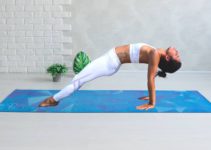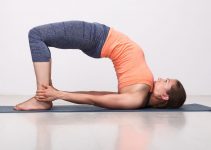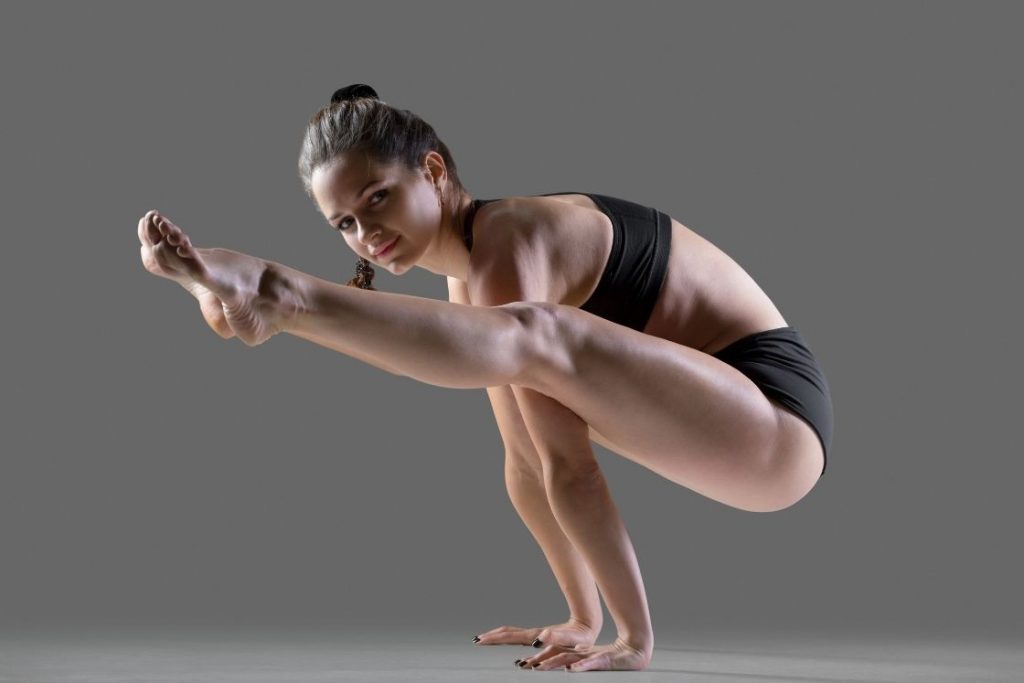
Firefly is a challenging posture in which the body is balanced on the arms. The strength and flexibility that this pose demand makes it an advanced level asana.
In firefly pose, the practitioner brings the knees to the shoulders keeping the feet to the floor. The arms are snuggled in between the legs, straightening the arms and palms balancing the body on the floor. The feet are then lifted off the floor and the whole body is balanced solely on the arms.
It stretches the core muscles, arms, wrists, and makes them stronger. It is also beneficial in improving the overall balance of the body.
Tittibhasana Meaning
Tittibhasana is better understood by focusing on its root terms. In Sanskrit, “tittibha” refers to “an insect-like firefly” and “asana” is “pose”.
Because in this pose, the body is lifted keeping only the hands on the floor, the posture mimics a firefly in flight, hence the name. The resemblance with the firefly explains its English name, i.e. Firefly pose.
This pose is helpful in releasing physical stress by expanding the muscles and releasing tension. The contraction effect of it gives quick benefits to abdominal organs. With lifting the legs, the hamstrings, groins, and adductor muscles are also stretched and strengthens.
Mythological Symbol
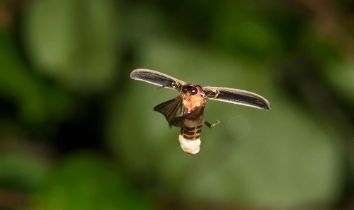
According to Hindu legends, Tittibha birds lay their eggs along the sea coast. But the sea who has immense power swept away their eggs. On this, Tittibha birds complained to Lord Vishnu (Ocean God) and Vishnu ordered the sea to return back their eggs.
In Tittibhasana, Tittibha, a small flying insect, is a representation of a yogi’s efforts to overcome the illusion created by Chitta. In this story, the sea is the metaphor used for Chitta. Like Sea, our Chitta becomes delusional because of power and ignorant but with the efforts, a yogi can overcome this.
Firefly Pose Practice Guide
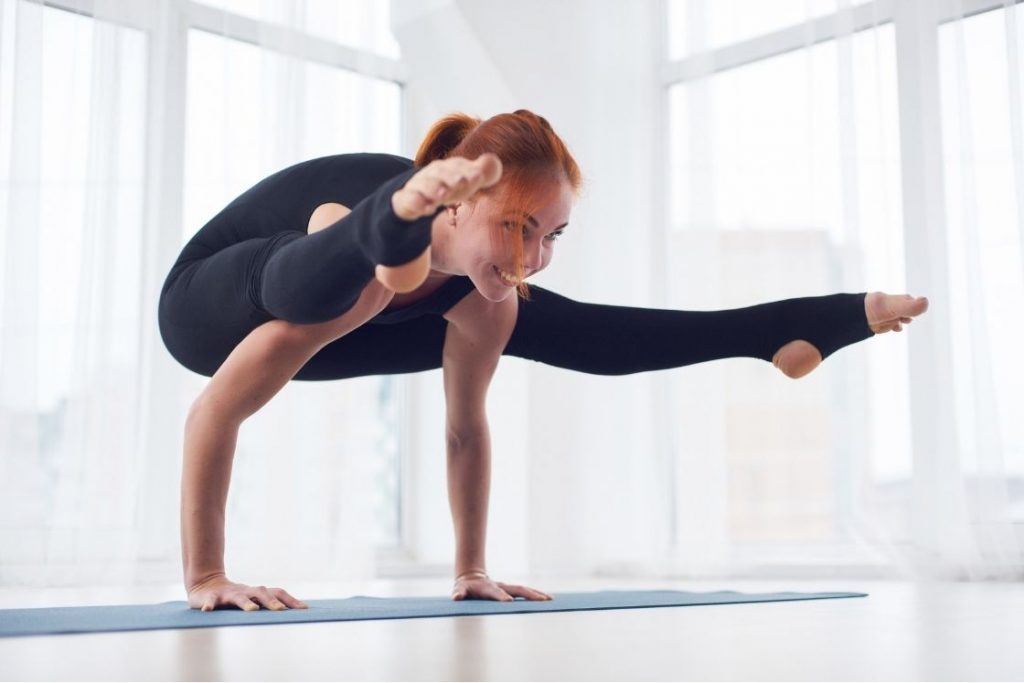
Precautions & Contraindications
- It is a difficult balancing pose, so there are chances to fall out of the pose. Therefore, use the props and find an open space to practice tittibhasana where you do not get hurt even if you fall.
- Avoid practicing tittibhasana if you have any injury in the wrist, shoulder, or lower back.
- Do not perform it while recovering from surgery.
- Pregnant women should not practice this asana.
- People with low blood pressure should avoid this pose.
Preparatory Poses
- Eagle Pose (Garudasana) (arms only)
- Garland Pose (Malasana)
- Crane Pose (Bakasana)
- Bound Angle Pose (Baddha Konasana)
How to Do Firefly Pose (Steps)
- Begin with sitting in dandasana.
- Spread the legs beyond your hips width and hands placed to the floor in between the legs.
- Bend your knees bringing them closer to armpits.
- Now lifting your butts off the floor, sit on your feet.
- Walk your hands behind your heels bringing the shoulders in contact with inner knees.
- Squeezing the elbows inwards sit back on that elbow-shelf, resting your buttocks in between the elbows.
- Balancing the weight on hands walk your toes forward and lift the feet off the floor.
- Inhale and straighten the legs forward shifting the sitting bones behind and rolling the thighs together.
- Look forward with toes pointing up and thighs hugging the upper arms.
- Raise the leg as far as possible opening them to the ceiling.
- Hold the pose for at least 15 seconds breathing gently.
- Exhale bending your knees and bringing your feet to the floor.
- Sit down on your butts releasing the shoulders from behind the heels, and relax.
Beginner’s tips
- Try performing firefly pose starting with tadasana followed by a forward bend. This beginning step eases the performance a bit.
- Use a block with the first dandasana step to elevate your feet off the floor. Then press palms in between legs on the floor and perform further steps.
Follow-up Poses
- Standing Forward Bend (Uttanasana)
- Downward-Facing Dog (Adho Mukha Svanasana)
- Upward-Facing Dog Pose (Urdhva Mukha Svanasana)
Modifications
Using the simple props given below you can modify the firefly pose in a easy manner.
- Yoga blocks – Sit on the floor with extending the legs forward separated wide apart. Place a block under both the heels. Bring the arms between the legs and pressing the palms to the floor lift your buttocks keeping the heels on the floor.
- Chair and blocks – Sit on a chair with feet on the floor and hands on your thighs. Place two blocks between the feet. Sliding the hands between the legs lean forward and bring your hands to the blocks. Slightly lift your legs off the floor, straighten your legs forward. Finally, try lifting the buttocks off the chair, balancing the body on hands.
- Blocks stacked against wall – Place two blocks stacked together against a wall. Sit on them and spread the legs forward. Press your palms to the floor, lifting the heels and then legs off the floor with the thighs hugging the upper arms. Taking the support from the wall lift your buttocks off the blocks.
Tittibhasana Variations
- Tittibhasana variation – Try the easier variation by avoiding the further lifting of the legs to the ceiling. Balancing the bodyweight on the hands lift the legs off the floor extending them forward. Stay there with the toes pointing up and heels facing forward.
- Tittibhasana variation Feet crossed – After lifting the legs off the floor and straightening them forward in tittibhasana. Bring your feet closer and cross the right ankle over the left. Now, maintain the pose.
- Tittibhasana with bent elbows – Keep the elbows slightly bent while balancing the body weight entirely on hands. It creates less strain on the wrists and legs also get support to stay parallel to the floor.
- Tittibhasana elbows to the floor – After attaining tittibhasana, bring your elbows to the floor. Bring your hands to the alternative elbows rotating the forearms at 90°.
- Tittibhasana one leg between the hands – In this variation, the position of hands vary. With the legs spread out, keep your left hand beside your inner right thigh and right hand beside the outer right thigh. Pressing the palms to the floor lift the body off the floor. Repeat the same with respect to the left leg.
Firefly Pose Benefits
1. Strengthens the muscles
The body weight is concentrated on the arms and pressurizes the muscles of shoulders, arms, and wrists. This enhances muscle endurance thereby making them stronger.
2. Stretches groins
The inner thigh muscles and groins are deeply stretched in the firefly pose. This, in turn, eases the muscle tension trapped in the lower body. Moreover, it enhances flexibility, relieves pain in groins, and improves leg mobility.
3. Abdominal toning
This posture is achieved by actively engaging the core muscles. These muscles remain contracted while holding the pose which acts as a workout toning the abdominal muscles. Therefore, also beneficial in burning belly fat.
4. Facilitates digestion
Along with toning the abdominal muscles, the digestive organs are also stimulated by the contraction effect of this pose. It facilitates efficiency and improves digestion.
5. Improves the body balance
Tittiasana is an intense balancing posture that exerts pressure on the wrists, arms, shoulders. The body is lifted off the ground and balanced against gravity. This practice opens the mind by making the practitioner mindful.
This mindful practice helps in gaining an overall sense of balance and also brings calm to the mind. Hence, mental as well as physical balance is gained.

